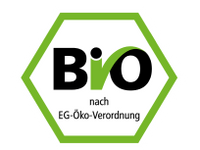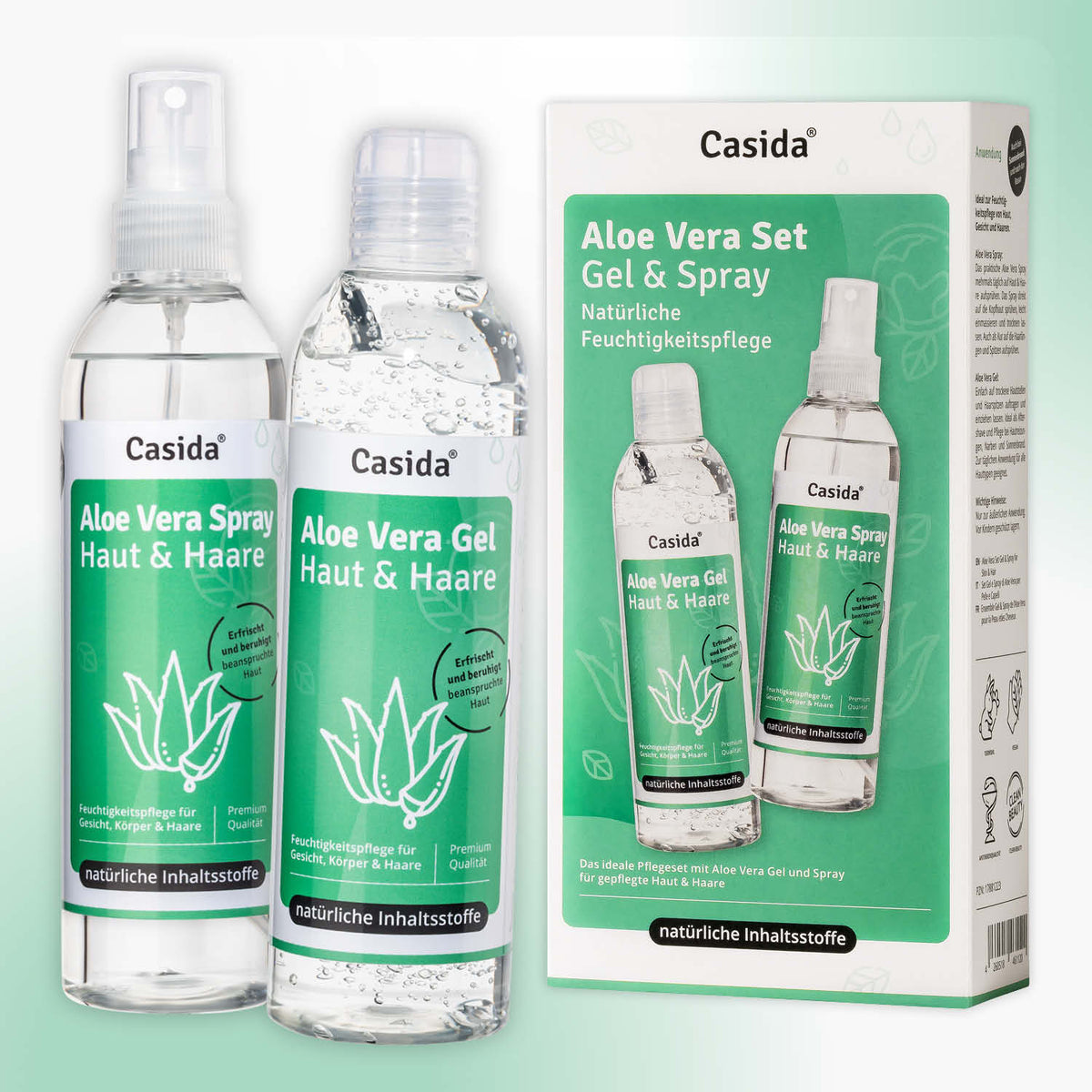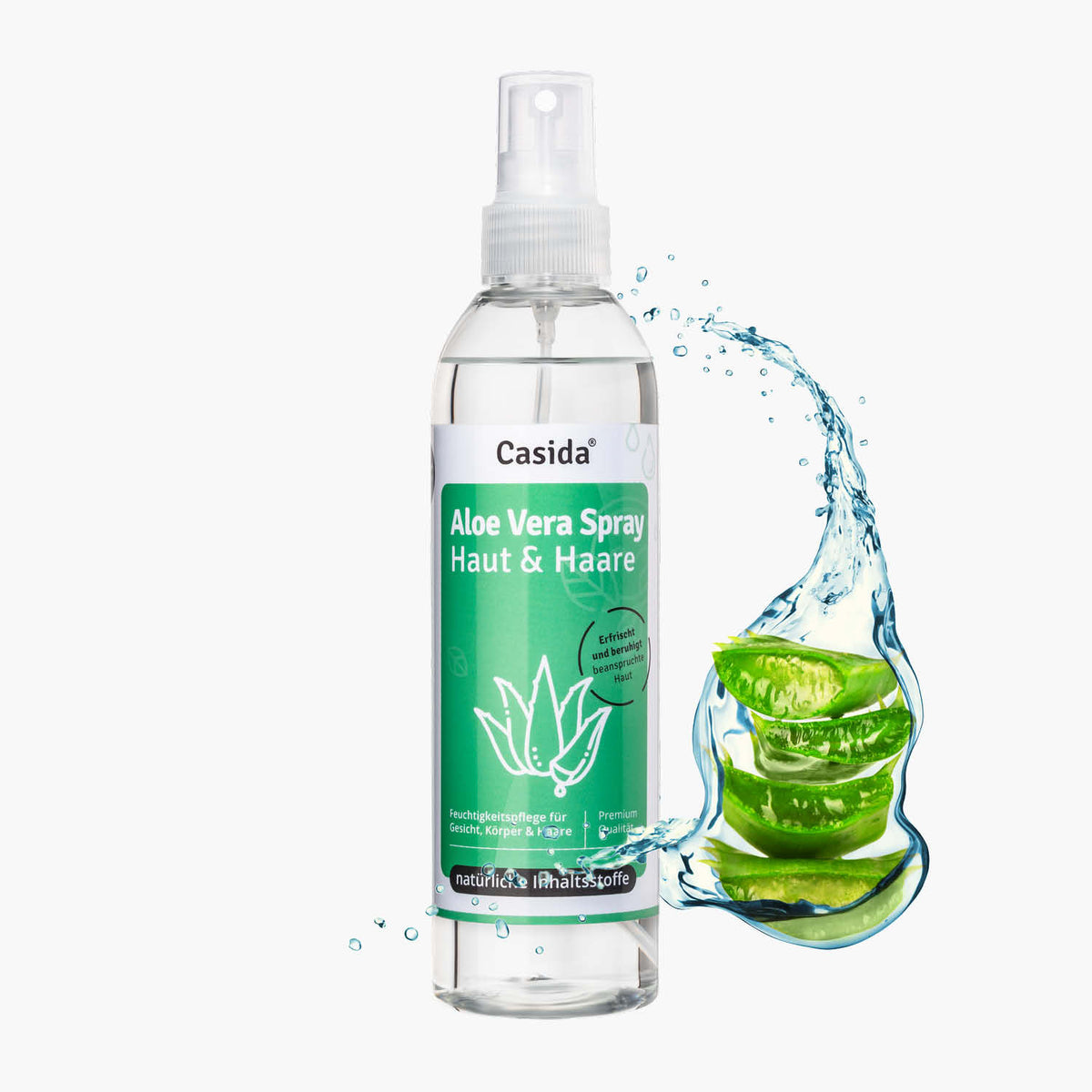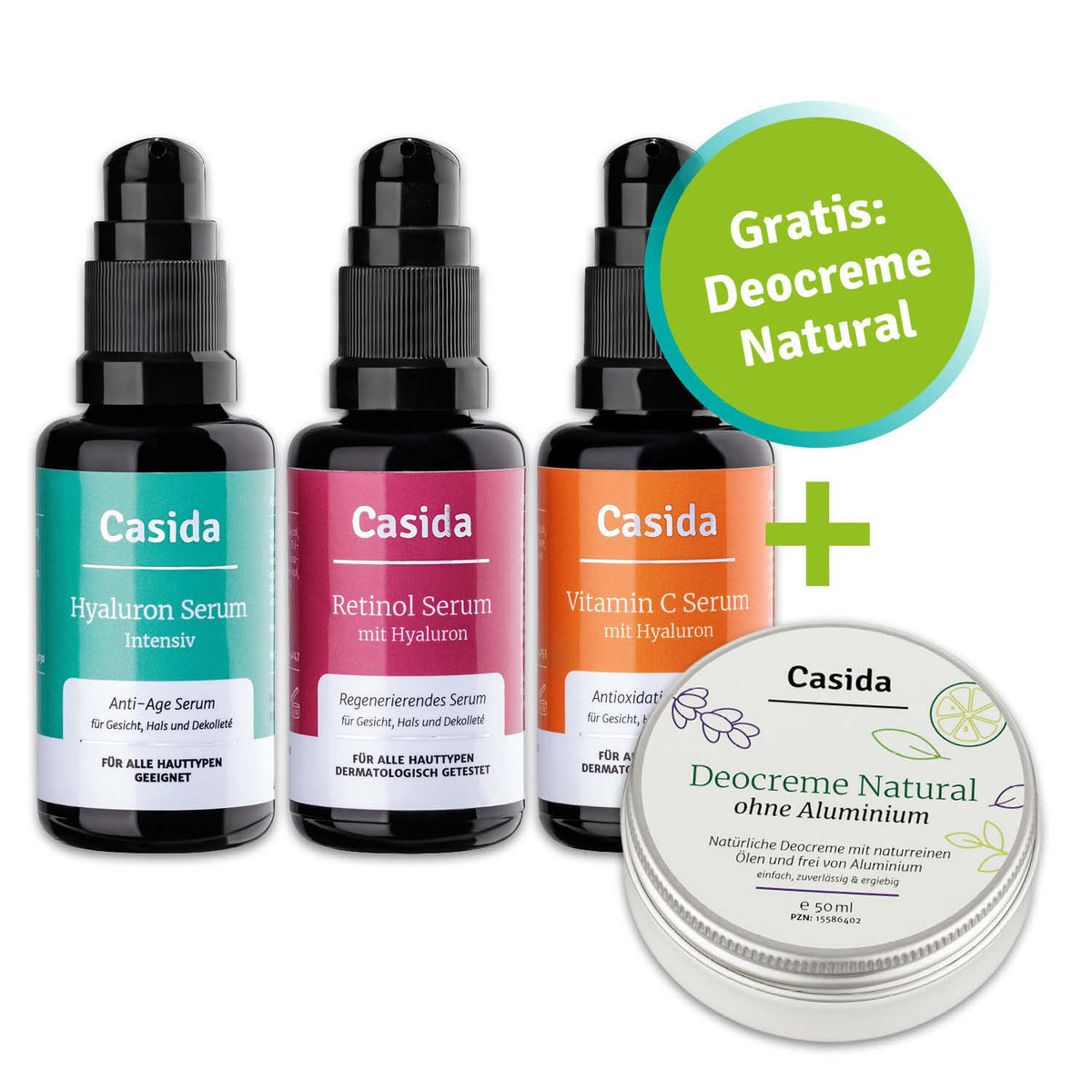Our modern lifestyle can easily upset the sensitive acid-base balance. The result is hyperacidity of the tissue, which can manifest itself in numerous complaints. If the acid-base balance is already disturbed to this extent, the body can no longer establish a healthy balance on its own. What can be done? Read below about the causes of acidosis, the symptoms and illnesses that are promoted by it and the measures you can take yourself to restore your acid-base balance.
Causes of acidosis - our unfavorable lifestyle
One of the main causes of acidosis is our modern, unhealthy diet. We eat too many acid-forming foods every day and too few alkaline foods. The following foods over-acidify the body:
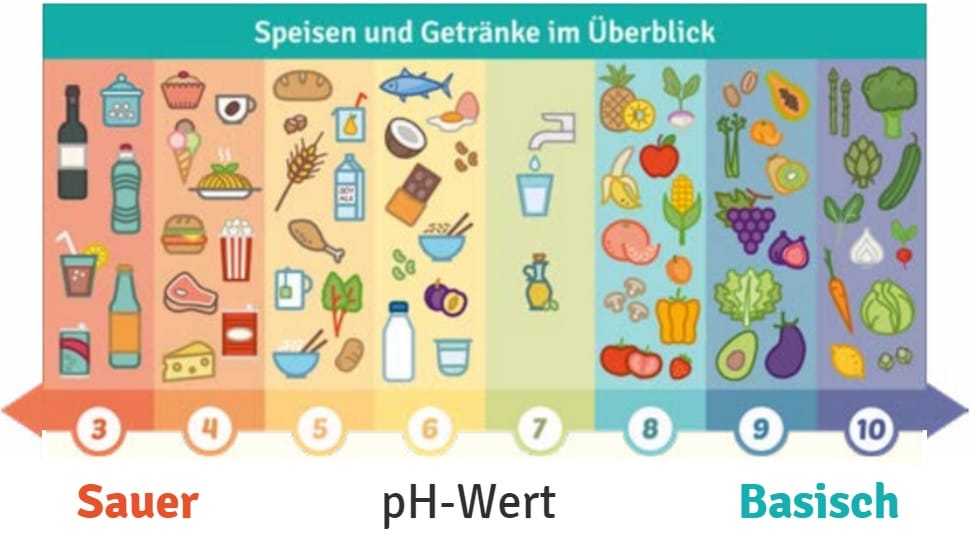 What else you can do to bring the acid-base ratio into a healthy balance:
Base therapeutics
An alkaline diet can be supplemented with alkaline therapy products in the form of food supplements. Suitable alkaline powders supply the body with alkaline minerals and valuable trace elements. Look out for high-quality products from the pharmacy with a balanced composition that effectively deacidify and are free from additives such as preservatives, colorants and flavorings.
Bitter substances
Industrial foods hardly contain any bitter substances. They have been bred out for reasons of taste. However, bitter substances are "bitterly necessary" for deacidification: they bind acids and ensure that they are excreted. Natural bitter substances from dandelion, ribwort plantain or other wild herbs are rarely found on the menu today and are therefore a useful food supplement, e.g. in the form of bitter capsules.
Alkaline baths
Full or foot baths with strongly alkaline bath additives (e.g. Epsom salt or baking soda) can help with deacidification. The application is very simple:
- To start, use the alkaline baths 2 to 4 times a week and then continue 1 time a week
- The water temperature should be between 37 and 40°C
- An alkaline bath requires a bathing time of 30 - 60 minutes, as acid excretion via the skin only starts after 30 minutes
- Important: drink enough
Magnesium
This miracle mineral is important for the reduction of tissue acidification, among other things. However, magnesium deficiency is widespread and can be associated with hyperacidity. Supplementing your diet with magnesium can therefore be useful. When making your choice: The organic compounds magnesium citrate and magnesium glycinate are particularly bioavailable. The magnesium powder should be free from flavorings, sugar, sweeteners, lactose, gluten, yeast, preservatives, anti-caking agents and colorants.
Magnesium-rich bath salts and magnesium oil also offer the possibility of external application.
Pharmacist Alexander Helm >
Alexander Helm is a licensed pharmacist (Martin Luther University) and founder of Casida. His vision is to combine pharmacy and naturopathy to create natural health products that use the power of nature to improve people's health.
Important note / Disclaimer:
As pharmacists, we share our pharmaceutical expertise and wealth of naturopathic experience in the Casida guide. An individual diagnosis and consultation is necessary in every case. Therefore, this offer cannot replace medical advice. It is not intended to treat, cure or prevent any disease. It is not a substitute for medication or other treatments prescribed by a doctor.
What else you can do to bring the acid-base ratio into a healthy balance:
Base therapeutics
An alkaline diet can be supplemented with alkaline therapy products in the form of food supplements. Suitable alkaline powders supply the body with alkaline minerals and valuable trace elements. Look out for high-quality products from the pharmacy with a balanced composition that effectively deacidify and are free from additives such as preservatives, colorants and flavorings.
Bitter substances
Industrial foods hardly contain any bitter substances. They have been bred out for reasons of taste. However, bitter substances are "bitterly necessary" for deacidification: they bind acids and ensure that they are excreted. Natural bitter substances from dandelion, ribwort plantain or other wild herbs are rarely found on the menu today and are therefore a useful food supplement, e.g. in the form of bitter capsules.
Alkaline baths
Full or foot baths with strongly alkaline bath additives (e.g. Epsom salt or baking soda) can help with deacidification. The application is very simple:
- To start, use the alkaline baths 2 to 4 times a week and then continue 1 time a week
- The water temperature should be between 37 and 40°C
- An alkaline bath requires a bathing time of 30 - 60 minutes, as acid excretion via the skin only starts after 30 minutes
- Important: drink enough
Magnesium
This miracle mineral is important for the reduction of tissue acidification, among other things. However, magnesium deficiency is widespread and can be associated with hyperacidity. Supplementing your diet with magnesium can therefore be useful. When making your choice: The organic compounds magnesium citrate and magnesium glycinate are particularly bioavailable. The magnesium powder should be free from flavorings, sugar, sweeteners, lactose, gluten, yeast, preservatives, anti-caking agents and colorants.
Magnesium-rich bath salts and magnesium oil also offer the possibility of external application.
Pharmacist Alexander Helm >
Alexander Helm is a licensed pharmacist (Martin Luther University) and founder of Casida. His vision is to combine pharmacy and naturopathy to create natural health products that use the power of nature to improve people's health.
Important note / Disclaimer:
As pharmacists, we share our pharmaceutical expertise and wealth of naturopathic experience in the Casida guide. An individual diagnosis and consultation is necessary in every case. Therefore, this offer cannot replace medical advice. It is not intended to treat, cure or prevent any disease. It is not a substitute for medication or other treatments prescribed by a doctor.
- Animal proteins such as meat, sausage, cheese, dairy products, milk, eggs, fish
- White sugar, desserts, sweet drinks
- White flour i.e. wheat bread, wheat pasta
- Coffee, black tea, alcohol, carbonated drinks
- Other factors: Nicotine, synthetic preservatives and colorants, synthetic sweeteners
- Do you often feel tired and listless, perhaps even listless and in a bad mood?
- Do you struggle with recurring infections or never feel really fit?
- Do you feel stressed easily and find it difficult to concentrate on one topic for long periods of time?
- Is your digestion giving you a hard time?
- Do you suffer from constipation, diarrhea, bloating, nausea?
- Do you have occasional headaches?
- Do your skin and eyes lack a glow? Are your nails brittle? Is your skin rather pale and are there dark shadows under your eyes?
- Do you have hair loss, water retention or orange peel skin?
- Do you occasionally have heartburn?
- Are you not losing weight despite adapting your diet?
- Do you frequently eat bread, pasta, rice, cheese, yoghurt or quark, sausage, meat and rarely fruit, vegetables and salad?
- Do you drink less than 2 liters of water or unsweetened tea a day?
- Do you drink coffee every day?
- Do you have muscle and joint complaints?
- Do you take medication regularly?
- Sugar and sweets
- White flour products
- Meat and sausage
- Milk and dairy products
- Carbonated drinks
- Coffee and caffeinated drinks
- Salad
- vegetables
- fruit
- Potatoes
- herbs
- spices
- Mushrooms
 What else you can do to bring the acid-base ratio into a healthy balance:
Base therapeutics
An alkaline diet can be supplemented with alkaline therapy products in the form of food supplements. Suitable alkaline powders supply the body with alkaline minerals and valuable trace elements. Look out for high-quality products from the pharmacy with a balanced composition that effectively deacidify and are free from additives such as preservatives, colorants and flavorings.
Bitter substances
Industrial foods hardly contain any bitter substances. They have been bred out for reasons of taste. However, bitter substances are "bitterly necessary" for deacidification: they bind acids and ensure that they are excreted. Natural bitter substances from dandelion, ribwort plantain or other wild herbs are rarely found on the menu today and are therefore a useful food supplement, e.g. in the form of bitter capsules.
Alkaline baths
Full or foot baths with strongly alkaline bath additives (e.g. Epsom salt or baking soda) can help with deacidification. The application is very simple:
- To start, use the alkaline baths 2 to 4 times a week and then continue 1 time a week
- The water temperature should be between 37 and 40°C
- An alkaline bath requires a bathing time of 30 - 60 minutes, as acid excretion via the skin only starts after 30 minutes
- Important: drink enough
Magnesium
This miracle mineral is important for the reduction of tissue acidification, among other things. However, magnesium deficiency is widespread and can be associated with hyperacidity. Supplementing your diet with magnesium can therefore be useful. When making your choice: The organic compounds magnesium citrate and magnesium glycinate are particularly bioavailable. The magnesium powder should be free from flavorings, sugar, sweeteners, lactose, gluten, yeast, preservatives, anti-caking agents and colorants.
Magnesium-rich bath salts and magnesium oil also offer the possibility of external application.
Pharmacist Alexander Helm >
Alexander Helm is a licensed pharmacist (Martin Luther University) and founder of Casida. His vision is to combine pharmacy and naturopathy to create natural health products that use the power of nature to improve people's health.
Important note / Disclaimer:
As pharmacists, we share our pharmaceutical expertise and wealth of naturopathic experience in the Casida guide. An individual diagnosis and consultation is necessary in every case. Therefore, this offer cannot replace medical advice. It is not intended to treat, cure or prevent any disease. It is not a substitute for medication or other treatments prescribed by a doctor.
What else you can do to bring the acid-base ratio into a healthy balance:
Base therapeutics
An alkaline diet can be supplemented with alkaline therapy products in the form of food supplements. Suitable alkaline powders supply the body with alkaline minerals and valuable trace elements. Look out for high-quality products from the pharmacy with a balanced composition that effectively deacidify and are free from additives such as preservatives, colorants and flavorings.
Bitter substances
Industrial foods hardly contain any bitter substances. They have been bred out for reasons of taste. However, bitter substances are "bitterly necessary" for deacidification: they bind acids and ensure that they are excreted. Natural bitter substances from dandelion, ribwort plantain or other wild herbs are rarely found on the menu today and are therefore a useful food supplement, e.g. in the form of bitter capsules.
Alkaline baths
Full or foot baths with strongly alkaline bath additives (e.g. Epsom salt or baking soda) can help with deacidification. The application is very simple:
- To start, use the alkaline baths 2 to 4 times a week and then continue 1 time a week
- The water temperature should be between 37 and 40°C
- An alkaline bath requires a bathing time of 30 - 60 minutes, as acid excretion via the skin only starts after 30 minutes
- Important: drink enough
Magnesium
This miracle mineral is important for the reduction of tissue acidification, among other things. However, magnesium deficiency is widespread and can be associated with hyperacidity. Supplementing your diet with magnesium can therefore be useful. When making your choice: The organic compounds magnesium citrate and magnesium glycinate are particularly bioavailable. The magnesium powder should be free from flavorings, sugar, sweeteners, lactose, gluten, yeast, preservatives, anti-caking agents and colorants.
Magnesium-rich bath salts and magnesium oil also offer the possibility of external application.
Pharmacist Alexander Helm >
Alexander Helm is a licensed pharmacist (Martin Luther University) and founder of Casida. His vision is to combine pharmacy and naturopathy to create natural health products that use the power of nature to improve people's health.
Important note / Disclaimer:
As pharmacists, we share our pharmaceutical expertise and wealth of naturopathic experience in the Casida guide. An individual diagnosis and consultation is necessary in every case. Therefore, this offer cannot replace medical advice. It is not intended to treat, cure or prevent any disease. It is not a substitute for medication or other treatments prescribed by a doctor.

